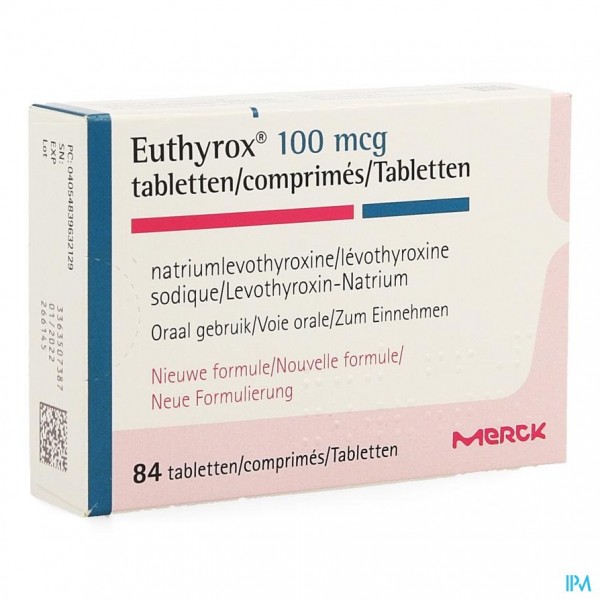Buy Levothyroxine | Buy Euthyrox | Buy Levothyroxine Without a Prescription
Levothyroxine, an active ingredient in Euthyrox, is a synthetic thyroid hormone intended for the treatment of thyroid disorders and conditions. It has the same effect as the natural hormone produced by the thyroid gland.
Buy Euthyrox is used:
- The treatment of benign thyroid hypertrophy in patients whose thyroid function is normal;
- To reappear of thyroid hypertrophy after surgery;
- To replace the natural thyroid hormone when the thyroid gland does not produce enough;
- To prevent tumor growth in patients with thyroid cancer.
Euthyrox 25 micrograms, 50 micrograms, 75 micrograms, and 100 micrograms are also used to balance thyroid hormone levels when overproduction of the hormone is treated with antithyroid agents.
Buy cheap Levothyroxine. Order Euthyrox 25mcg, 50mcg, 75mcg, and 100mcg discreetly online without a prescription, safely and reliably through our Dutch online pharmacy.
What is levothyroxine
Buy Levothyroxine Without Prescription (also called sodium levothyroxine or L-T4) is a synthetic thyroid hormone that works in the same way as a natural thyroid hormone.
It is the active ingredient in Euthyrox® (Merck Laboratory), a medication prescribed for hypothyroidism, which is characterized by insufficient secretion of natural thyroxine by the thyroid gland. It is also prescribed for goiter, to curb the pituitary gland’s excitatory action on the thyroid gland.
Taking a synthetic thyroid hormone, such as levothyroxine, therefore makes it possible to overcome the lack of hormone production by the thyroid gland.
When should you take levothyroxine?
A levothyroxine purchase treatment may be considered in the context:
- Hypothyroidism (in other words, when the thyroid gland doesn’t produce enough thyroid hormones T3 and T4). Levothyroxine can “replace” the T4 hormone and thus correct the symptoms of hypothyroidism: increased absorption of asthenia, weight gain, hypersensitivity to cold, increased basal metabolic rate, heart rate, and intestinal transit.
- Of a goiter (characterized by the increase in the volume of the thyroid gland).
- From a thyroidectomy.
- From a thyroid tumor.
- Conditions, associated or not with hypothyroidism, where it is necessary to curb TSH.
Levothyroxine | Dosage
The dosage of Levothyroxine depends on the severity of hypothyroidism, the patient’s age, and their tolerance. The dose is usually increased in successive steps, monitored by an endocrinologist. A blood test with a TSH dose is necessary when adjusting the dosage.
It is not formally recommended to increase or decrease the dosage yourself. It is also advisable to take levothyroxine on an empty stomach (so it is better absorbed by the body), preferably in the morning on an empty stomach, 30 minutes before breakfast.
Levothyroxine should not be used in the following cases:
- Hyperthyroidism (unless subject to specific treatment).
- of myocarditis.
- of recent myocardial infarction.
- of an acute coronary syndrome.
- Hypersensitivity or intolerance to any of the ingredients (lactose, castor oil).
Levothyroxine Euthyrox side effects
Buying levothyroxine without a prescription can potentially worsen heart conditions (e.g., angina or heart failure) and cause various allergic reactions, as well as symptoms of hyperthyroidism: fever, sweating, diarrhea, palpitations, involuntary tremors, insomnia, difficulty sleeping, agitation, and rapid weight loss. It can also cause hypercalciuria (excessive calcium concentration in the urine) in children.
If one or more of these side effects occur, contact your doctor immediately. Your doctor may eventually decide to stop treatment for a few days or gradually reduce the daily dose until the side effects disappear.
Hypersensitivity reactions to any of the components of Euthyrox may occur. Allergic reactions typically include swelling of the face or throat (angioedema). If these symptoms occur, contact your doctor immediately.
Precautions for use
Levothyroxine tends to increase heart rate. Therefore, in cases of cardiac pathology, this treatment can only be implemented after a consultation between a cardiologist and an endocrinologist to assess the balance of this treatment and the most appropriate dosage.
In case of chronic heart disease, the introduction of levothyroxine treatment, if decided, should be very progressive and regularly monitored.
In the event of a change in specialty, thyroid balance should be monitored. Likewise, if you are taking other treatments (oral anticoagulants, enzyme inducers, chloroquine, proguanil).



